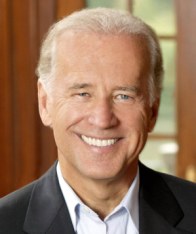How Late Will Biden Challengers Enter the Democratic Field?
Prior to 2024, only one of the non-fringe candidates to launch campaigns against their party’s president in the modern primary era did so prior to July in the year before the election
 Another week of rough job approval and horserace matchup polling numbers for Joe Biden continues to fuel speculation that, despite his official campaign launch last month, other candidates may yet jump into the race if his reelection prospects continue to look grim in the coming months.
Another week of rough job approval and horserace matchup polling numbers for Joe Biden continues to fuel speculation that, despite his official campaign launch last month, other candidates may yet jump into the race if his reelection prospects continue to look grim in the coming months.
Evidence of the lukewarm support for Biden in his own party can be seen by the steady 25 percent going to announced candidates Robert F. Kennedy Jr. and Marianne Williamson when paired up against Biden.
There is little doubt that some of this stated support for Kennedy and Williamson is nothing more than anti-Biden sentiment – something incumbents from both parties have seen during the primaries (e.g. fringe Democratic candidate and ex-felon Lyndon LaRouche received more than 10 percent of the vote against President Bill Clinton during the 1996 Colorado, Louisiana, Oklahoma, Nebraska, and West Virginia primaries).
But how late is too late for bona fide candidates to jump into the race to challenge a sitting president from their own party?
Although none of the following listed candidacies were successful in winning their party’s nomination over the last half-century, and only two garnered any traction, nearly all intra-party incumbent challengers launched their campaigns several months after Memorial Day.
[It should be noted comparisons in this report are not quite apples-to-apples over the decades, due to the increased frontloading of primaries as well as costs of running a campaign].
During the 1972 cycle, Republican U.S. Representatives Pete McCloskey of California and John Ashbrook of Ohio did not file to take on Richard Nixon until July 9th and December 29th of 1971 respectively.
During the 1976 cycle, former California Governor Ronald Reagan launched his campaign against President Gerald Ford on November 20, 1975.
Similarly, Massachusetts U.S. Senator Ted Kennedy and California Governor Jerry Brown announced they were challenging Jimmy Carter on November 7th and November 8th of 1979 respectively. Mississippi Governor Cliff Finch waited more than a month and a half later, filing on December 24th.
Likewise, conservative commentator Pat Buchanan announced his campaign against President George H.W. Bush on December 10, 1991.
During the 2020 cycle, former GOP Massachusetts Governor Bill Weld launched his candidacy against Donald Trump on April 15, 2019 with former Illinois U.S. Representative Joe Walsh (August 25th) and former South Carolina Governor and U.S. Representative Mark Sanford (September 8th) waiting until the late summer.
[Note: Only fringe or perennial candidates challenged Presidents Reagan in 1984, Clinton in 1996, George W. Bush in 2004, and Barack Obama in 2012].
Of these aforementioned candidates, only two – Reagan and Ted Kennedy – were successful in carrying any states during the primaries.
And so will any other Democrats jump into the race yet this year?
Nearly all once-rumored 2024 Democratic hopefuls have stated they are not interested in running for their party’s nomination this cycle. That said, the longer Biden’s numbers remain significantly underwater, the greater pressure there will be for one or more of them to get into the race – and the less politically unseemly their entrance will likely appear to party- and Biden-loyalists.
Follow Smart Politics on Twitter.

“Likewise, conservative commentator Pat Buchanan announced his campaign against President George W. Bush on December 10, 1991.”
Actually George H. W. Bush was president at this point.
“Of these 11 aforementioned candidates, only two – Reagan and Ted Kennedy – were successfully in carrying any states during the primaries.”
That should say were successful in carrying or were successfully able to carry.
Thanks for catching the typos, Connor – much appreciated!
The modern primary era began in 1972 of course, but two more data points come from the preceding cycle. Eugene McCarthy announced his primary campaign against incumbent Lyndon B. Johnson on November 30, 1967. Robert F. Kennedy was also challenging the sitting president when he announced on March 16, 1968, though Johnson gave his famous Shermanesque statement later that month. [Note: Johnson had not yet formally begun a presidential campaign for 1968 at the time of that speech; he had (albeit by a slimmer margin than expected) defeated McCarthy in the New Hampshire primary as a write-in candidate.]
Those who were speculated as Biden’s likeliest potential challengers have not only said they won’t run, essentially all of them have affirmatively endorsed Biden. [I’m guessing most of them, being ideologically quite similar to Biden, were probably not actually ever going to run against him but were waiting in the wings in case he decided not to run. That being said, the endorsements from the progressive wing of the party, including Bernie Sanders (as well as other prominent members of the Congressional Progressive Caucus), are notable: It is difficult to imagine Williamson’s campaign, for instance, gaining traction without their support; since no debates will be scheduled and she holds no office herself, she has few other ways of attaining media coverage.]
It would take a remarkable change in circumstances for a substantial number of endorsers to rescind their support and switch to a new challenger. Do you know if this was the case in 1976 or 1980? Or were many influential party members waiting on the sidelines for someone to jump in? I suppose this question might be hard to answer since formal public declarations of support a year away from the actual start of the primaries were not as common then.